|
|
|
Sort Order |
|
|
|
Items / Page
|
|
|
|
|
|
|
| Srl | Item |
| 1 |
ID:
121620
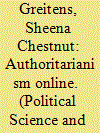

|
|
|
|
|
| Publication |
2013.
|
| Summary/Abstract |
What kind of Internet data is generated in authoritarian political environments? And how can political scientists use that data to better understand the dynamics of nondemocratic regimes?
|
|
|
|
|
|
|
|
|
|
|
|
|
|
|
|
| 2 |
ID:
187977
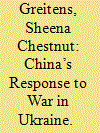

|
|
|
|
|
| Summary/Abstract |
Russia’s decision to invade Ukraine in February 2022 posed challenges for the People’s Republic of China and its priorities. This article assesses the Chinese party-state’s response across four dimensions: informational, diplomatic, economic, and military-strategic. Beijing has been most supportive of Moscow in the informational and diplomatic arenas; its economic posture has been mostly self-interested, and military support for Russia has remained more or less constant. China’s stance on the conflict in Ukraine appears to be shaped by several factors: a perceived need to counter the United States; the desire to support Russia while minimizing the costs of doing so to Chinese interests; China’s desire for internal political stability and particular features of its domestic political system that affect foreign policy decision-making; and Beijing’s evolving assessments of what the Ukraine conflict might foretell for Taiwan. The article summarizes China’s interests at the time the conflict began, outlines the party-state’s response, and assesses potential explanations for that response, with specific attention to implications for Taiwan.
|
|
|
|
|
|
|
|
|
|
|
|
|
|
|
|
| 3 |
ID:
170591
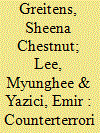

|
|
|
|
|
| Summary/Abstract |
In 2017–18, the Chinese Communist Party (CCP) changed its domestic security strategy in Xinjiang, escalating the use of mass detention, ideological re-education, and pressure on Uyghur diaspora networks. Commonly proposed explanations for this shift focus on domestic factors: ethnic unrest, minority policy, and regional leadership. The CCP's strategy changes in Xinjiang, however, were also likely catalyzed by changing perceptions of the threat posed by Uyghur contact with transnational Islamic militant groups in Southeast Asia and the Middle East, and a corresponding increase in perceived domestic vulnerability. This threat shifted from theoretical risk to operational reality in 2014–16, and occurred alongside a revised assessment that China's Muslim population was more vulnerable to infiltration by jihadist networks than previously believed. Belief in the need to preventively inoculate an entire population from “infection” by these networks explains the timing of the change in repressive strategy, shift toward collective detention, heavy use of re-education, and attention paid to the Uyghur diaspora. It therefore helps explain specific aspects of the timing and nature of the CCP's strategy changes in Xinjiang. These findings have implications for the study of the connections between counterterrorism and domestic repression, as well as for authoritarian preventive repression and Chinese security policy at home and abroad.
|
|
|
|
|
|
|
|
|
|
|
|
|
|
|
|
| 4 |
ID:
173852
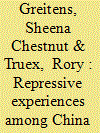

|
|
|
|
|
| Summary/Abstract |
This paper examines the nature of China's current research climate and its effects on foreign scholarship. Drawing on an original survey of over 500 China scholars, we find that repressive research experiences are a rare but real phenomenon and collectively present a barrier to the conduct of research in China. Roughly 9 per cent of China scholars report that they have been “invited to tea” by authorities within the past ten years; 26 per cent of scholars who conduct archival research report being denied access; and 5 per cent of researchers report some difficulty obtaining a visa. The paper provides descriptive information on the nature of these experiences and their determinants. It concludes with a discussion of self-censorship and strategies for conducting research on China.
|
|
|
|
|
|
|
|
|
|
|
|
|
|
|
|
| 5 |
ID:
156607
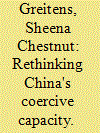

|
|
|
|
|
| Summary/Abstract |
Discussions of China's rising domestic security expenditure often present this spending as evidence of the Chinese Communist Party's strong coercive capacity. This article argues that a lack of theoretical clarity about domestic security has resulted in flawed conclusions about these expenditures and their implications for China's coercive capacity. Challenging the conventional wisdom, the article analyses China's domestic security spending from 1992 through 2012 and argues that it is important to consider not only the total amount that China spends but also how it spends these resources and the magnitude of the threats that this expenditure must address. It finds that China's domestic security spending is not historically unprecedented, is not expanding as a proportion of national expenditure, and is not necessarily high (or producing high coercive capacity) when compared to other countries. The article also shows that certain locations struggle more to fund their coercive capacity than others, and that these locations overlap with areas where internal security threats may be particularly acute. The challenges that the coercive apparatus must address have also grown over the same period during which domestic security spending has risen. Finally, attempts to improve the political position of China's coercive agents cannot be equated with improvements in their capacity to manage Chinese society. Cumulatively, this reassessment provides more evidence of the limitations on China's coercive capacity than of its strength.
|
|
|
|
|
|
|
|
|
|
|
|
|
|
|
|
| 6 |
ID:
185975


|
|
|
|
|
| Summary/Abstract |
Current scholarship on marketization from below in North Korea emphasizes the increased influence of private actors, and portrays this process as eroding state control. While these accounts are largely accurate, they risk overlooking significant policy responses on the part of North Korea’s leadership. Over the course of the past decade, the regime under Kim Jong Un has actively pursued a political-economic model that attempts to institutionalize market activity under strengthened party-state political control. In doing so, the DPRK is hewing toward a model of “market Leninism” or “party-state capitalism” akin to that pursued by contemporary China and Vietnam, rather than that of the Soviet Union or Eastern Europe. By placing North Korea’s political economy in this framework, we can better understand the two key imperatives that have characterized Kim Jong Un’s rule: institutionalization of market mechanisms and strengthened political control.
|
|
|
|
|
|
|
|
|
|
|
|
|
|
|
|
|
|
|
|
|